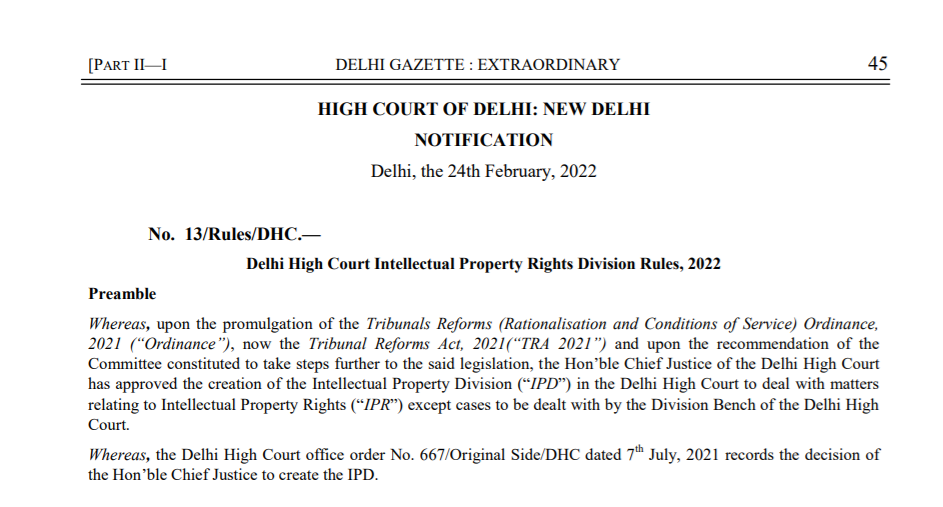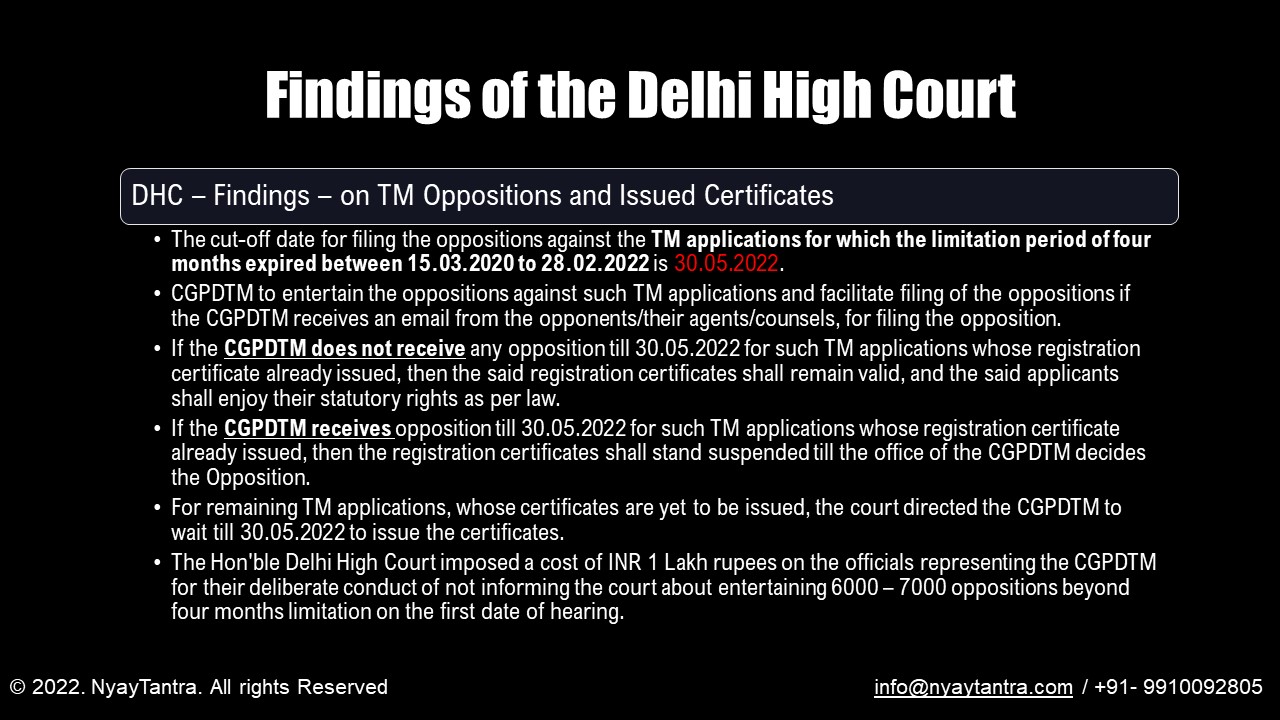The Tribunal Reforms Act, 2021 abolished the Intellectual Property Appellate Board (“IPAB”) and amended various intellectual property-related laws to establish jurisdiction of the High Court to adjudicate IPR matters. Accordingly, the Hon’ble Delhi High Court created a separate Intellectual Property Division (“IPD”) to deal exclusively with intellectual property related matters. On February 24, 2022, the Hon’ble Delhi High Court published the Intellectual Property Rights Division Rules, 2022, to exercise its original and appellate jurisdictional powers in IPR related matters. The salient features of the IPD Rules 2022 can assist us in understanding the legal framework of adjudication of the IPR related issues at the Hon’ble Delhi High Court.
- 1.1 Single Judge Bench under the IPD and Jurisdiction
- 1.2 Damages/Account of Profits
- 1.3 Rights of Audience of Patent/TM agents
- 1.4 Legislations Covered under IPD:
- 1.5 Subject Matter – IPD
- 1.6 Types of Proceedings Under the IPD
- 1.7 Procedures before the IPD
- 1.8 Mediation and Early Neutral Evaluation (ENE)
- 1.9 Appeals from orders of the IPD
1.1 Single Judge Bench under the IPD and Jurisdiction
The IPD will be presided over by a Single Judge Bench who will hear and adjudicate disputes and cases concerning IPR subject matter. However, under section 13 of the Commercial Courts Act, 2015, the Division Bench of the Hon’ble Delhi High Court will have the jurisdiction to adjudicate the appeal matters.
1.2 Damages/Account of Profits
Any party seeking damages/account of profits must provide a reasonable estimate of the amounts claimed and the foundational facts/account statements to claim damages/account of profits. In addition, the party can submit documentary or oral evidence to support such claims. The Court may take the assistance of an expert too in the computation of damages. In addition, the Court will also consider the following factors while determining the quantum of damages.
(i) Lost profits suffered by the injured party;
(ii) Profits earned by the infringing party;
(iii) Quantum of income which the injured party may have earned through royalties/license fees, had the use of the subject IPR been duly authorized;
(iv) The duration of the infringement;
(v) Degree of intention/neglect underlying the infringement;
(vi) Conduct of the infringing party to mitigate the damages being incurred by the injured party;
1.3 Rights of Audience of Patent/TM agents
The IPD Rules 2022 provides a right of audience to the registered Patent agents or Trade Mark agents knowing the subject matter of the dispute. However, this right of audience is not absolute and is available only upon permission by the Court. Once permitted, the registered Patent Agents or Trademark Agents can appear along with the counsels/legal practitioners representing the parties to assist the Court.
1.4 Legislations Covered under IPD:
The IPR division of the Hon’ble Delhi High Court will handle matters primarily arising from the Trade ‘Marks Act, 1999; The Copyright Act, 1957; the Patents Act, 1970; the Designs Act, 2000; the Geographical Indications of Goods (Registration and Protection) Act 1999; the Protection of Plant Varieties and Farmers’ Rights Act, 2001, and The Semiconductor Integrated Circuits Layout- Design Act, 2000.
1.5 Subject Matter – IPD
1.5.1 Types of Intellectual Property Covered under the IPD:
The IPD will consider matters about Patents, Copyrights, Trade Marks, Geographical Indications, Plant Varieties, Designs, Semiconductor integrated circuit layout designs, Traditional Knowledge and all rights under common law, if any, associated therewith.
The IPD division will deal with actions seeking to enforce rights under common law, including passing off acts of unfair competition, disparagement, comparative advertising, and associated matters.
The IPD division will also deal with rights seeking protection of trade secrets, breach of confidential information and related subject matters. Furthermore, the tortious actions involving intellectual property, privacy and publicity rights will come under the purview of the IPD. In addition to these rights, the IPD will also deal with rights on data protection, data exclusivity and related matters. In addition, any internet violations relating to any of the said IPR matters will also come under the purview of the IPD.
1.6 Types of Proceedings Under the IPD
The IPD proceedings shall include all original proceedings, appellate and other proceedings related to IPR matters. Further, the IPD will hear matters related to IPR suits, revocation applications, cancellation applications, other original proceedings, appeals and petitions from the various intellectual property offices and all other proceedings which were hitherto maintainable before the IPAB. In addition, the proceedings of any litigation or suits filed at the Hon’ble Delhi High Court in which the subject matter is an IPR, either under the respective statutes or under common law including suits relating to breach of privacy, rights of publicity will be under the IPD of the Delhi High Court.
The IPD will be responsible for proceedings of the Writ Petitions (Civil) [WP(C)], Civil Mise. (Mains) [CM(Main)], Regular First Appeal [RFA], First Appeal from Order [FAO], and Civil Revision Petition [CRP] arising out of IPR matters.
1.7 Procedures before the IPD
The IPD rules 2022 discloses separate procedures for Appeals, Civil Original Petitions, Writ petitions, Civil Miscellaneous Main Petitions, Regular First Appeal, First Appeal from the Order and Civil Revision Petition. However, in case of suits before the IPD, the provisions of the Commercial Courts Act, 2015, Code of Civil Procedure, 1908 as applicable to commercial suits and the Delhi High Court (Original Side) Rules, 2018 will be applicable. The patent suits filed with the IPD shall be governed by the Patent Suit Rules, 2022 and the above rules.
1.8 Mediation and Early Neutral Evaluation (ENE)
If at any stage in any proceedings before the IPD, the Hon’ble Delhi High Court is of the opinion that the parties ought to explore mediation. In that case, the Court may appoint a qualified mediator or panel of mediators, including mediators with training or experience in IPR subject matter(s).
Interestingly, even the parties’ consent is not required once the Court believes that an amicable resolution needs to be explored. The Mediation proceedings will be conducted under the aegis of the Delhi High Court Mediation and Conciliation Centre and, where necessary, in collaboration with the relevant IPO.
Further, the Court may also direct ENE by appointing a qualified and independent evaluator if it believes that such ENE would assist in early resolution. Finally, the Mediation/ENE proceedings may proceed concurrently with the legal proceedings before the Court so as not to delay adjudication.
1.9 Appeals from orders of the IPD
If any party wishes to appeal from the orders/judgements of the IPD, in that case, the appeal shall lie to the Division Bench of the Hon’ble Delhi High Court either in Letters Patent Appeal (LPA) or in the form of appeal to the Commercial Appellate Division under Section 13, Commercial Courts Act, 2015.

